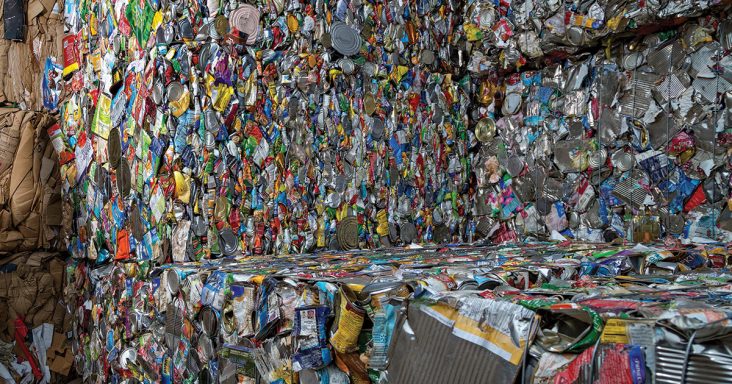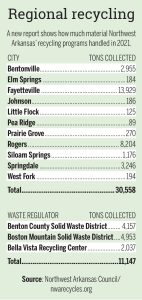Consistent messaging essential to boost recycling effort in Northwest Arkansas
by June 12, 2022 10:14 am 1,178 views

Nearly 90% of 4,000 Northwest Arkansas residents polled in a recent survey conducted by Springdale nonprofit Northwest Arkansas Council said recycling is important to the region’s future.
“It feels good to be working on something that people want us to work on,” said Dan Holtmeyer, the council’s recycling program manager.
NWA Recycles is the program’s name, and its goal is to advance recycling in Northwest Arkansas by promoting collaboration, transparency and public awareness to increase participation. Initially for two years, the program is a joint effort by the council and the Benton County and Boston Mountain solid waste districts that launched last year with financial support from Walmart. Since May 2021, Holtmeyer has led the council’s efforts in working with several cities and regional partners.
In the long-term, Holtmeyer said Northwest Arkansas communities benefit from recycling by preserving landfill space and conserving natural resources. Finding messaging consistency and ways to improve existing systems — and finding ways for them to work together — is essential.
Doing so would be another advantage that keeps the growing region a desirable place to live.

“It’s a very pragmatic concern,” Holtmeyer explained. “We only have one landfill [in Northwest Arkansas], which will probably be the only one we have, based on various factors. It’s got plenty of room for now. But it’s a finite landfill, and we need to conserve space.
“On the natural resources side of things, to many folks and me, it just seems like common sense to get the most out of the resources that we use. And that means recycling. A lot of raw materials we use can be recycled forever, essentially. Especially things like metal and glass. Nothing is stopping us from melting it down and reusing it forever, for as long as we are around.”
In support of its work, the council released a report in May to give some data-based perspective to the region’s recycling efforts. According to the report, Northwest Arkansas recycled more than 41,000 tons of material in 2021.
The collections included typical recyclables, like aluminum cans and cardboard, and more unusual materials such as used tires, electronics, and food and yard waste, all of which can be recycled and reused somehow.
The council said the report is the first to tally collections from the Benton County and Boston Mountain solid waste districts and a dozen cities with public recycling programs.

The programs recorded range from E-Waste Warriors, a volunteer group of Rogers high school students that collected 5 tons of old electronics, to the city of Fayetteville, which collected more than 13,000 tons in its recycling and composting programs. Among the report’s findings, the region in 2021 recycled:
- 300 tons of electronic waste.
- 1,000 tons of aluminum, steel and other scrap metal.
- 1,000 tons of glass bottles and jars.
- 9,000 tons of yard and food waste for composting.
- 14,000 tons of cardboard and paper.
According to the report, the figures, in reality, are higher since many community programs don’t track the weights of specific materials.
A significant challenge is a lack of consistent data, making it difficult for residents, community leaders and businesses that might use recycled materials in their products to see what the region’s programs are doing.
“Recycling can help build a more circular economy that reuses valuable materials that would otherwise be wasted, conserves limited landfill space and sustains local jobs and businesses,” said Rachel Spencer, Walmart’s senior manager for community resiliency. “Regional coordination is the key to improving recycling efforts in NWA, and this report reveals the need for more collaboration in collection data, measuring progress and setting recycling goals. With robust partnerships, we can build public trust in the region’s recycling programs and attract recycling companies’ interest — ultimately leading to more and better recycling in Northwest Arkansas.”
The annual report is the first in an ongoing effort that will likely improve over time by including more private and commercial recycling data that is not accounted for in public programs and more information about non-recyclable materials captured by recycling programs. The council’s recycling program will continue working with the waste districts and other stakeholders to help strengthen local programs and their available data.
“What the report illustrates — and what we knew already — is how further our data could go,” Holtmeyer said. “We don’t have a regional capture rate, [but] we start with what we have. Stick something and go from there.”
Holtmeyer recently led a three-day trip to Minneapolis, Minn., with Northwest Arkansas recycling stakeholders and elected officials to learn about the recycling programs happening in the Twin Cities region.
“I think we came away with a renewed interest and desire for a regional, consistent message regarding recycling,” Holtmeyer said. “Consistent information for residents about what can be recycled, how it works and why it’s worth it.
Holtmeyer said the council would host a recycling program meeting on June 21. A group of more than 100 recycling stakeholders and proponents is expected to attend.
“A lot of recycling is [already] happening here,” Holtmeyer said. “People can get frustrated with how picky the systems can be, or doubt that it’s worth the effort. There’s always room for improvement, but our communities and hauling companies are doing good work. It’s worthwhile. The people involved want to work [together] as a region and we want things to be clear and understandable for residents.”
